新目标八年级上册英语专题:复合不定代词
- 格式:docx
- 大小:18.19 KB
- 文档页数:6
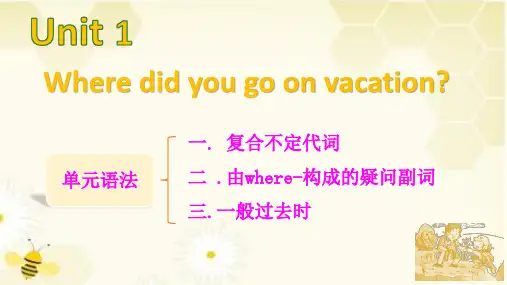
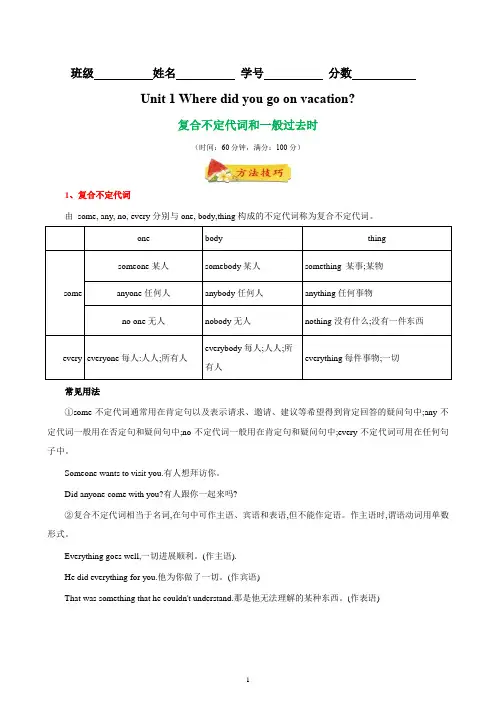
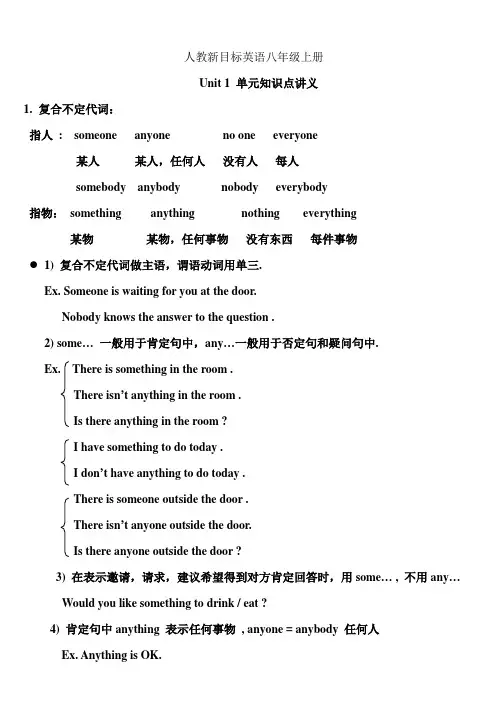
人教新目标英语八年级上册Unit 1 单元知识点讲义1.复合不定代词:指人: someone anyone no one everyone某人某人,任何人没有人每人somebody anybody nobody everybody指物:something anything nothing everything某物某物,任何事物没有东西每件事物1) 复合不定代词做主语,谓语动词用单三.Ex. Someone is waiting for you at the door.Nobody knows the answer to the question .2) some…一般用于肯定句中,any…一般用于否定句和疑问句中.Ex. There is something in the room .There isn’t anything in the room .Is there anything in the room ?I have something to do today .I don’t have anything to do today .There is someone outside the door .There isn’t anyone outside the door.Is there anyone outside the door ?3) 在表示邀请,请求,建议希望得到对方肯定回答时,用some… , 不用any…Would you like something to drink / eat ?4) 肯定句中anything 表示任何事物, anyone = anybody 任何人Ex. Anything is OK.I can do anything for you .Anybody knows the answer.5) 形容词或to do 形式修饰复合不定代词时要后置.Ex. There is nothing wrong with my car.I have something important to tell you .There isn’t anything interesting here .Do you want something to drink / eat ?6) not everybody / everyone / everything 表示部分否定,意为‘并非都…’Ex. Not everyone likes singing .Not everything goes well .not any …和no…表示全部否定Ex. He listened ,but heard nothing .He listened ,but didn’t hear anything .not anything = nothing not anyone/ body = no one / nobodyEx. There is nothing in the bottle . = There isn’t anything in the bottle.7) no one 指人,回答Who 提问, no one of … / nobody 不能加ofnothing 指物, 不能加of none 指人或物,回答Is there …? 提问none of …Ex. Who is in the room ? No one .Is there anyone in the room ? None .2.表地点复合不定副词:somewhere anywhere某地,肯定句中某地,否定句和疑问句中/ 任何地方,肯定句中nowhere everywhere没有地方到处,每个地方, 用于肯定句中Ex. I want to go somewhere interesting .3.wonderful adj. 精彩的Ex. We had a wonderful time on the beach .It is such a wonderful film that we all enjoy it .who…wonder v. 想知道what…引导的宾语从句,用陈述句语序why…Ex. I wonder who the boy is . = I want to know who the boy is .I wonder what they are doing . =I want to know what they are doing .wonder +特殊疑问词+ to doEx. I wonder what to do . = I want to know what to do . = I wonder what I should do.I wonder where to go . / I wonder how to do that .4、几乎没有few 后接可数名词复数(否)little 后接不可数名词肯 a few 有一些,后加可数名词复数quite a few 相当多,不少a little 有点,后加不可数名词quite a little相当多,不少only a few 只有一点only a littlevery few 非常少very littleEx. I have a few friends. 肯I have few friends . 否I have quite a few friends .a little 修饰adj. = kind of= a little bit5. most of the time 大部分时间most of the foodmost of us/themmost of + n. = most +n.Ex. Most of the students like English . = Most students like English .6. Of course . = Sure. = Certainly . 当然.7. 反身代词第一人称:myself ourselves 我们自己第二人称:yourself 你自己yourselves 你们自己第三人称:himself 他自己herself 她自己itself 它自己themselves 他们自己8. seem 似乎,好像1) seem to be +形容词/名词= seem + 形容词/名词似乎…Ex. That seems to be her mother . = That seems her mother .It seems to be too difficult . = It seems too difficult.2) seem to do sthHe seems to have a cold.3) It seems that + 从句.It seems that he is happy. = He seems to be happy . = He seems happy.9. adj. bored 感到无聊的修饰人boring 令人厌烦的修饰事或物I feel bored , because the movie is boring.be bored with …对…感到无聊Ex. I’m bored with the boring movie.10. keep / write a diary = keep /write diaries 记日记(keep优先使用)11. activity n. 活动activities 复数Ex. What activities did you find interesting ?12. decide 决定1) decide to do sth. 决定做某事= make a decision to do sth = make one’s mind doing sthThey decide to visit the museum.decide not to do sth 决定不要做某事decide + 疑问词+动词不定式He can not decide when to leave.2) decide + 宾语从句(陈述句语序)He can’t decide when he leaves .I can’t decide where I should go. 改为同义句I can’t decide where to go.13. try to do sth. 努力尽力去做某事Ex. You must try to pass the exam.try doing sth. 试着做某事Ex. He tried making a model plane.try one’s best to do sth = do one’s best to do sth 尽最大努力做某事Ex. You should try your best to learn English well .have a try 试一试try on 试穿Ex. Let me have a try .14. feel like1)给……的感觉,后接从句He feels like he is swimming.I felt like I was a bird.2) feel like 想要后接名词/代词/doing sthfeel like doing sth = want to do sth =would like to do sth想要做某事Do you feel like taking a walk with me ?Do you want to take a walk with me ?3) feel + 形容词, 感到…I feel bored .look +adj. sound+adj. feel +adj.look like +n. sound like+n. feel like +n.15.look 看起来taste 尝起来be( was were is am are)sound 听起来feel 感觉摸起来系动词+adj.smell 闻起来seem 似乎16. build v. 建筑n. 体格of medium build 中等身材building n. 建筑物,大楼builder n. 建筑师16.difference n. 不同点-----differences n. 复数different adj. 不同的be different from …不同于… = not the same as…Ex. 1) Chinese names are different from English names. = Chinese names aren’t the same as English names .2) I’m different from you . = I’m not the same as you .3) I can’t see the differences between the buses in the picture.n. 不同之处17. on the top of the hill在山顶, 面at the top of the hill 在山顶, 点(最高点)at the foot of the hill在山脚下walk up to the hill top 径直走向山顶come top 登顶,得第一Ex. He always comes top every exam.18. wait for + 人或物wait 不及物动词,连接forEx. I’ll wait for you at the door.He waited over an hour for the train . ( He waited for the train over an hour. )can’t wait to do sth 迫不及待做某事Ex. The wonderful vacation , I can’t wait .19. because + 从句because of + n./ pron./ doingBecause the weather was bad, we couldn’t see anything below.Because of the bad weather, we could n’t see anything below.20. enough 1) adj足够的,修饰名词做定语We have enough time to do our homework.I have enough money .2) adv.足够地,充分地,用来修饰形容词或副词,一般置于被修饰词之后I know him well enough.我足够了解他。
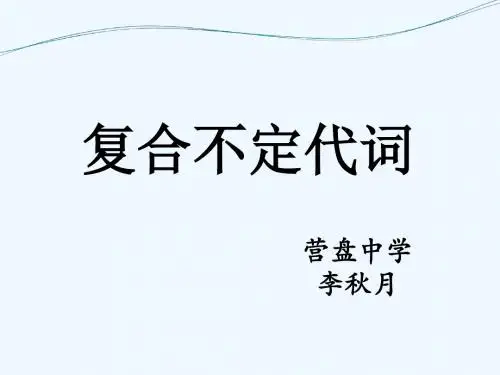
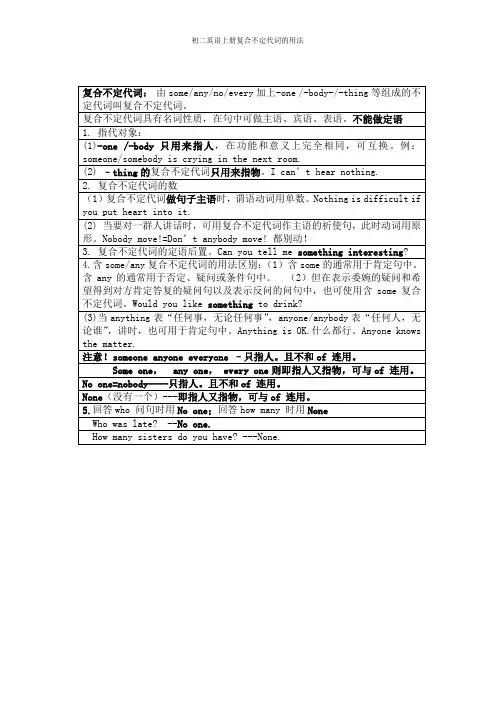
初二英语上册复合不定代词的用法复合不定代词:由some/any/no/every加上-one /-body-/-thing等组成的不定代词叫复合不定代词。
复合不定代词具有名词性质,在句中可做主语、宾语、表语。
不能做定语1.指代对象:(1)-one /-body 只用来指人,在功能和意义上完全相同,可互换。
例:someone/somebody is crying in the next room.(2) –thing的复合不定代词只用来指物。
I can’t hear nothing.2. 复合不定代词的数(1)复合不定代词做句子主语时,谓语动词用单数。
Nothing is difficult if you put heart into it.(2) 当要对一群人讲话时,可用复合不定代词作主语的祈使句,此时动词用原形。
Nobody move!=Don’t anybody move! 都别动!3. 复合不定代词的定语后置。
Can you tell me something interesting?4.含some/any复合不定代词的用法区别:(1)含some的通常用于肯定句中。
含any的通常用于否定、疑问或条件句中。
(2)但在表示委婉的疑问和希望得到对方肯定答复的疑问句以及表示反问的问句中,也可使用含some复合不定代词。
Would you like something to drink?(3)当anything表“任何事,无论任何事”,anyone/anybody表“任何人,无论谁”,讲时,也可用于肯定句中。
Anything is OK.什么都行。
Anyone knows the matter.注意!someone anyone everyone –只指人。
且不和of 连用。
Some one, any one, every one则即指人又指物,可与of 连用。
No one=nobody----只指人。
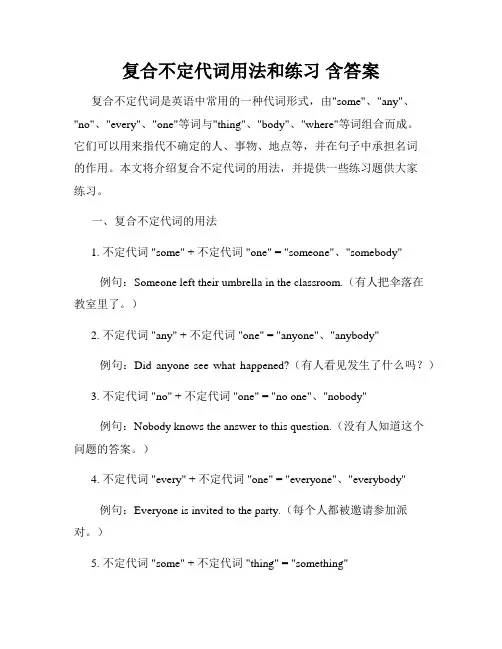
复合不定代词用法和练习含答案复合不定代词是英语中常用的一种代词形式,由"some"、"any"、"no"、"every"、"one"等词与"thing"、"body"、"where"等词组合而成。
它们可以用来指代不确定的人、事物、地点等,并在句子中承担名词的作用。
本文将介绍复合不定代词的用法,并提供一些练习题供大家练习。
一、复合不定代词的用法1. 不定代词 "some" + 不定代词 "one" = "someone"、"somebody"例句:Someone left their umbrella in the classroom.(有人把伞落在教室里了。
)2. 不定代词 "any" + 不定代词 "one" = "anyone"、"anybody"例句:Did anyone see what happened?(有人看见发生了什么吗?)3. 不定代词 "no" + 不定代词 "one" = "no one"、"nobody"例句:Nobody knows the answer to this question.(没有人知道这个问题的答案。
)4. 不定代词 "every" + 不定代词 "one" = "everyone"、"everybody"例句:Everyone is invited to the party.(每个人都被邀请参加派对。
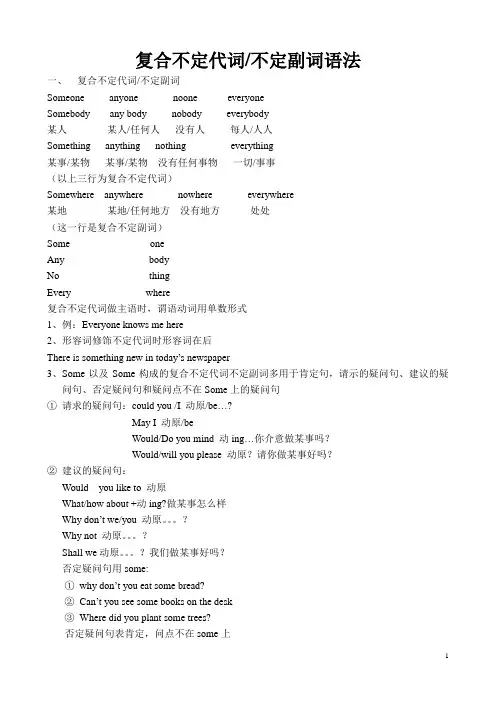
复合不定代词/不定副词语法一、复合不定代词/不定副词Someone anyone noone everyoneSomebody any body nobody everybody某人某人/任何人没有人每人/人人Something anything nothing everything某事/某物某事/某物没有任何事物一切/事事(以上三行为复合不定代词)Somewhere anywhere nowhere everywhere某地某地/任何地方没有地方处处(这一行是复合不定副词)Some oneAny bodyNo thingEvery where复合不定代词做主语时,谓语动词用单数形式1、例:Everyone knows me here2、形容词修饰不定代词时形容词在后There is something new in today’s newspaper3、Some以及Some构成的复合不定代词不定副词多用于肯定句,请示的疑问句、建议的疑问句、否定疑问句和疑问点不在Some上的疑问句①请求的疑问句:could you /I 动原/be…?May I 动原/beWould/Do you mind 动ing…你介意做某事吗?Would/will you please 动原?请你做某事好吗?②建议的疑问句:Would you like to 动原What/how about +动ing?做某事怎么样Why don’t we/you 动原。
?Why not 动原。
?Shall we动原。
?我们做某事好吗?否定疑问句用some:①why don’t you eat some bread?②Can’t you see some books on the desk③Where did you plant some trees?否定疑问句表肯定,问点不在some上4、any以及any构成的词多用于否定句、疑问句、if条件句和含否定词的句子中注意any以及any构成的词在否定句中不可做主事而应换成相应的no one=nobody nothing1)If you wan’t anything ,please let me know2)He is too busy to see anyone come in3)The boy is too heavy for anyone to carry4)Anyone doesn’t know me here改错:No one knows me here5、any以及any构成的词在否定句中为完全否定not…any=no not…any one/anybody-none/nobodynot… anything=nothingnot…anywhere=nowhere,I can’t see anything in the room=I can see nothing in the room6、any以及any构成的词也可用于肯定句Any:任何一个any one=anybody 任何人anything任何事物He is taller than anyone else in my classYou can take any og them7、Every以及Every构成的词在否定句中为不完全否定①He knows everything 改否定句:He knows nothing而不能改成He doesn’t know everything他不是事事都懂(否一半)8、表示人的复合不定代词用人称代词、物主代词替换时一般用复数形式,有时用单数,根据上下文来定①If anyone invites you, you have to meet them on time(前面用三单,后面是宾格复数them) 拓展思维:宾格是人称代词,人称代词有主格宾格之分,主格有I,he,she,it, you, we,they. 宾格有me, him, her, it, you, us, them.主格的要放在主语位置,宾格的要放在宾语位置。
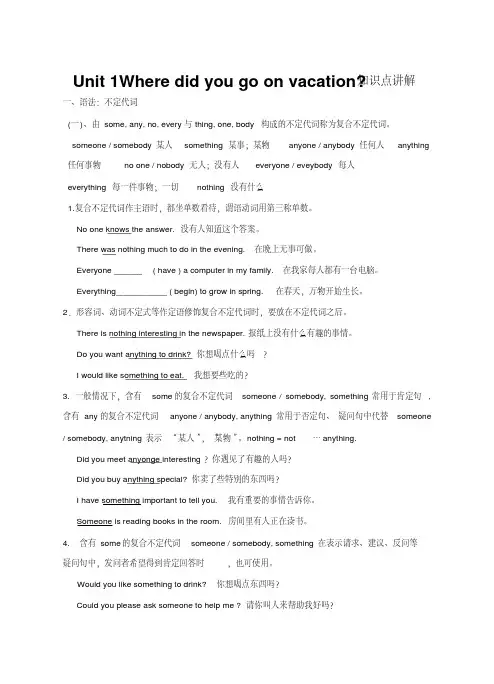
Unit 1Where did you go on vacation?知识点讲解一、语法:不定代词(一)、由some, any, no, every与thing, one, body 构成的不定代词称为复合不定代词。
someone / somebody 某人something 某事;某物anyone / anybody 任何人anything 任何事物no one / nobody 无人;没有人everyone / eveybody 每人everything 每一件事物;一切nothing 没有什么1.复合不定代词作主语时,都坐单数看待,谓语动词用第三称单数。
No one knows the answer. 没有人知道这个答案。
There was nothing much to do in the evening. 在晚上无事可做。
Everyone ______ ( have ) a computer in my family. 在我家每人都有一台电脑。
Everything___________ ( begin) to grow in spring. 在春天,万物开始生长。
2.形容词、动词不定式等作定语修饰复合不定代词时,要放在不定代词之后。
There is nothing interesting in the newspaper.报纸上没有什么有趣的事情。
Do you want anything to drink?你想喝点什么吗?I would like something to eat. 我想要些吃的?3. 一般情况下,含有some的复合不定代词someone / somebody, something常用于肯定句,含有any的复合不定代词anyone / anybody, anything常用于否定句、疑问句中代替someone / somebody, anytning表示“ 某人”,“某物”。
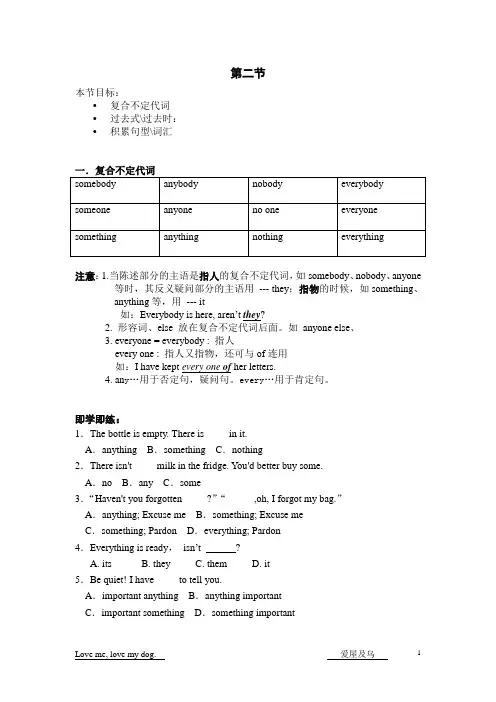
第二节本节目标:•复合不定代词•过去式\过去时:•积累句型\词汇注意:1.当陈述部分的主语是指人的复合不定代词,如somebody、nobody、anyone 等时,其反义疑问部分的主语用--- they;指物的时候,如something、anything等,用--- it如:Everybody is here, aren’t they?2. 形容词、else 放在复合不定代词后面。
如anyone else、3. everyone = everybody : 指人every one : 指人又指物,还可与of连用如:I have kept every one of her letters.4. an y…用于否定句,疑问句。
every…用于肯定句。
即学即练:1.The bottle is empty. There is ____ in it.A.anything B.something C.nothing2.There isn't ____ milk in the fridge. You'd better buy some.A.no B.any C.some3.“Haven't you forgotten ____ ?”“____ ,oh, I forgot my bag.”A.anything; Excuse me B.something; Excuse meC.something; Pardon D.everything; Pardon4.Everything is ready,isn’t ?A. itsB. theyC. themD. it5.Be quiet! I have ____ to tell you.A.important anything B.anything importantC.important something D.something important二.过去式\过去时1.掌握常见动词的过去式:规则变化、不规则变化2.过去时的标志:yesterday、yesterday morning\afternoon\evening、last week\month\year、in 2008、two years ago即学即练:1.your parents at home last week﹖A.Is B.Was C.Are D.Were2.The twins in Dalian last year.They here now.A.are; were B.were; are C.was; are D.were; was 3.___________? He did some reading at home.A . What does your father do yesterday evening?B . What does your brother do in the school?C . What did your brother do over the weekend?D. Where did your brother go last Sunday?4.What did you do ________ ? I went to the movies.A next morning B. last weekend C in the weekend D next Monday5.you go out with anyone? No, no one was there. was on vacation.A. Do AnyoneB. Did AnyoneC. Did EveryoneD. was Everyone6.He turned off the lights and then the classroom.A. leavesB. will leaveC. is leavingD. left7.She _________(not visit) her aunt last weekend.8.Carol ________(study) for the math test and ________(practice) English last night.9.They all _________(go) to the mountains yesterday morning.10.How _________(be) Jim's weekend? It _________(be not) bad.*作文练习:假如你叫李明,去年在因特网上结识了一位笔友Jack。
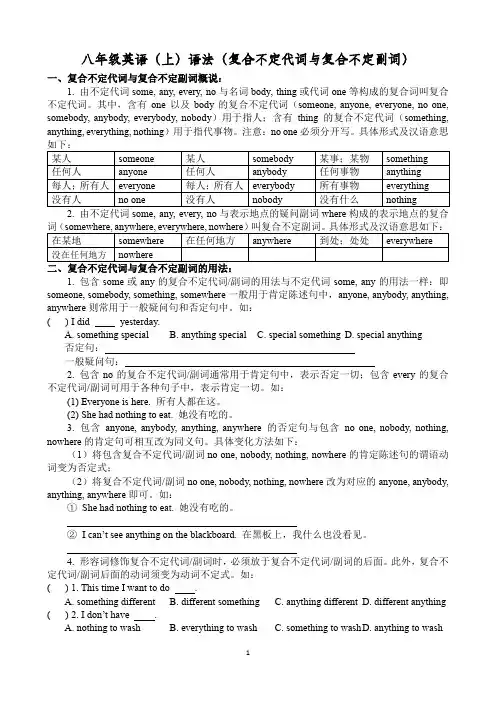
八年级英语(上)语法(复合不定代词与复合不定副词)一、复合不定代词与复合不定副词概说:1. 由不定代词some, any, every, no与名词body, thing或代词one等构成的复合词叫复合不定代词。
其中,含有one以及body的复合不定代词(someone, anyone, everyone, no one, somebody, anybody, everybody, nobody)用于指人;含有thing的复合不定代词(something, anything, everything, nothing)用于指代事物。
注意:no one必须分开写。
具体形式及汉语意1. 包含some或any的复合不定代词/副词的用法与不定代词some, any的用法一样:即someone, somebody, something, somewhere一般用于肯定陈述句中,anyone, anybody, anything, anywhere则常用于一般疑问句和否定句中。
如:( ) I did yesterday.A. something specialB. anything specialC. special somethingD. special anything否定句:一般疑问句:2. 包含no的复合不定代词/副词通常用于肯定句中,表示否定一切;包含every的复合不定代词/副词可用于各种句子中,表示肯定一切。
如:(1) Everyone is here. 所有人都在这。
(2) She had nothing to eat. 她没有吃的。
3. 包含anyone, anybody, anything, anywhere的否定句与包含no one, nobody, nothing, nowhere的肯定句可相互改为同义句。
具体变化方法如下:(1)将包含复合不定代词/副词no one, nobody, nothing, nowhere的肯定陈述句的谓语动词变为否定式;(2)将复合不定代词/副词no one, nobody, nothing, nowhere改为对应的anyone, anybody, anything, anywhere即可。
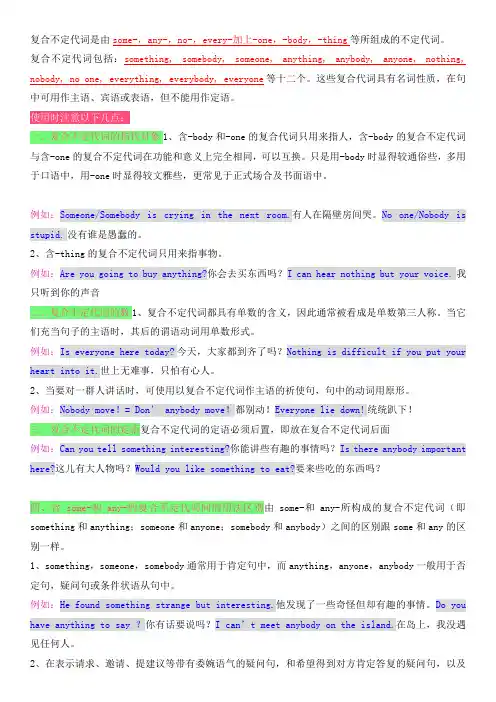
复合不定代词是由some-,any-,no-,every-加上-one,-body,-thing等所组成的不定代词。
复合不定代词包括:something, somebody, someone, anything, anybody, anyone, nothing, nobody, no one, everything, everybody, everyone等十二个。
这些复合代词具有名词性质,在句中可用作主语、宾语或表语,但不能用作定语。
一、复合不定代词的指代对象1、含-body和-one的复合代词只用来指人,含-body的复合不定代词与含-one的复合不定代词在功能和意义上完全相同,可以互换。
只是用-body时显得较通俗些,多用于口语中,用-one时显得较文雅些,更常见于正式场合及书面语中。
例如:Someone/Somebody is crying in the next room.有人在隔壁房间哭。
No one/Nobody is stupid.没有谁是愚蠢的。
2、含-thing的复合不定代词只用来指事物。
例如:Are you going to buy anything?你会去买东西吗?I can hear nothing but your voice.我只听到你的声音二、复合不定代词的数1、复合不定代词都具有单数的含义,因此通常被看成是单数第三人称。
当它们充当句子的主语时,其后的谓语动词用单数形式。
例如:Is everyone here today?今天,大家都到齐了吗?Nothing is difficult if you put your heart into it.世上无难事,只怕有心人。
2、当要对一群人讲话时,可使用以复合不定代词作主语的祈使句,句中的动词用原形。
例如:Nobody move!= Don’ anybody move!都别动!Everyone lie down!统统趴下!三、复合不定代词的定语复合不定代词的定语必须后置,即放在复合不定代词后面例如:Can you tell something interesting?你能讲些有趣的事情吗?Is there anybody important here?这儿有大人物吗?Would you like something to eat?要来些吃的东西吗?四、含some-和any-的复合不定代词间的用法区别由some-和any-所构成的复合不定代词(即something和anything;someone和anyone;somebody和anybody)之间的区别跟some和any的区别一样。
新目标英语8年级上册单元重点语法Unit 1八年级上册Unit 1语法复合不定代词和一般过去时(时间:60分钟,满分:100分)一、单项选择(本大题共50小题,每小题1分,共50分)1.—Life is the most important.—I think so. ________ is more important than life.A.Something B.Anything C.Nothing D.Everything2.The school concert was so amazing that ________ left in the middle of it.A.everybody B.anybody C.nobody D.somebody3.Our school is going to have a sports meeting tomorrow. ________ is ready now. A.Something B.Everything C.Anything D.Nothing4.—Does _______ else want to come?—No, no one wants to come.A.anyone B.someone C.anything D.something5.There is ________ wrong with my computer. It doesn’t work now.A.something B.anything C.everything6.—Hey, Bruce! _______ is waiting for you at the school gate.—Oh, maybe it is my brother.A.Someone B.Anyone C.Everyone7.A bus hit a tree this morning. Luckily, ________ was hurt.A.somebody B.anybody C.everybody D.nobody8.—I didn’t eat ________ this morning. I’m hungry.—There are ________ cookies in my bag. Would you like ________?A.anything; some; some B.anything; some; any C.something; any; some 9.—Where did you go? I visited you, but ________ was in.—I went fishing with my friends all afternoon.A.nobody B.somebody C.everybody D.anybody10.—Excuse me, is there ________ important in today’s newspaper?—Let me see. Oh, China sent its Tianhe Space Station Core Module (核心舱) on April 29th, 2021. A.anything B.something C.everything D.nothing11.There isn’t ________ interesting in the newspaper.A.something B.anything C.nothing D.everything12.—Have you brought the book we need now?—Sorry, I was in such a hurry that I didn’t bring _________ with me.A.anything B.something C.nothing D.everything13.I’d love to visit ________.A.anywhere warm B.warm anywhereC.somewhere warm D.warm somewhere14.I’d like to go ________.A.to somewhere peaceful B.to peaceful somewhereC.somewhere peaceful D.peaceful somewhere15.Almost ________ in our group visited the history museum last weekend.A.anyone B.everyone C.someone16.I’ve waited for a long time. I hope not to have ________ to do.A.something boring B.anything boring C.something bored17.There isn’t ________ interesting or surprising in the newspaper today.A.something B.everything C.anything D.nothing18.—Are you free tomorrow? Let’s go skating.—All right. I have ________ to do.A.nothing B.something C.anything D.everything19.—What do you think of My Country, My Parents?—Wonderful. But I don’t think _________ will like it.A.somebody B.anybody C.everybody D.nobody20.—Tom, there’s ________ on TV. Let’s play chess.— Sounds good.A.anything interesting B.interesting anything C.nothinginteresting D.interesting nothing21.—Sam, today is Mother’s Day.—Let’s buy ______ for our mother after school.A.something special B.anything specialC.special something D.special anything22.—Doctor, what’s wrong with my mom?—Don’t worry. It is ________ serious. It’s only a cold.A.nothing B.something C.anything D.everything23.—I find more and more people begin to exercise to keep healthy these days.—Yeah. ________ is more important than our health.A.Something B.Anything C.Nothing D.Everything24.—Will you buy ________ on your vacation, Mary?—Yes, I am going to buy some beautiful paintings for my mother.A.something special B.special somethingC.anything special D.special anything25.—Is there ________ in the classroom?—No, I can see ________ there.A.anybody; somebody B.somebody; anybody C.nobody; anybody D.anybody; nobody26.I don’t feel very well today. I don’t want to have ________.A.something B.nothing C.anything D.some27.—Did you meet ________?—Yes. I met some very interesting people.A.someone interesting B.anyone interesting C.interestingsomeone D.interesting anyone28.I am hungry now. I want ________ to eat.A.something nice B.nice something C.something bad29.I couldn’t find ________ in the English newspaper. So I took down some new words instead. A.something interesting B.anything interestingC.interesting something D.interesting anything30.Lucy is really kind and friendly. ________ in the class likes her.A.Someone B.Anyone C.Everyone D.No one31.The old woman hid the box in such a safe place that she believed ________ would find it. A.anybody B.nobody C.somebody D.everybody32.Sorry for being late. ________urgent happened on my way here.A.something B.nothing C.anything D.everything33.—Laura, ________ called you just now when you were out.—Thank you. It must be my mom.A.nobody B.anybody C.everybody D.somebody34.—Don’t smoke here.Look at the sign!—Sorry, I ________ see that.A.don’t B.won’t C.didn’t D.haven’t35.—I have seen the fashion show on TV with my cousin at home.—When _________ you _________ it?A.will; see B.have; seen C.did; see D.do; see36.I ________ shy. Doing projects with others has helped me become outgoing.A.was used to be B.was used to being C.used to be D.used to 37.—When ________ your father ________ this car?—About half a year ago.A.has; bought B.have; bought C.will; buy D.did; buy38.I’m sorry you’ve missed the train. It ________ five minutes ago.A.will leave B.has left C.left D.leaves39.Why are you so late? The parade ________ twenty minutes ago.A.has begun B.has been C.began D.has been on40.It only ________ me half an hour ________ to school every day last term.A.takes; to ride B.spent; to ride C.cost; walk D.took; to walk41.I ________ t hat new movie with my friends last month. It’s amazing.A.watch B.watched C.watches D.have watched42.I was busy last night. I ________ a model plane with my father.A.make B.made C.am making D.have made43.Not long ago, he ________ a birthday present for his mother.A.has bought B.bought C.buys D.will buy44.We ________ two hours on the trip to the park. It was too ________.A.spend; bored B.take; boring C.spent; boring D.took; bored45.The town ________ a lot of pollution in the past but it is not a problem any more. A.has B.is having C.will have D.had46.—Could I use your dictionary, Tom? Mine is at home.—Sorry. I ________ it to my cousin yesterday.A.lend B.lent C.borrow D.borrowed47.—I ________ a traffic accident yesterday. Many passengers were hurt.—That’s terrible!A.saw B.watched C.looked D.see48.My father used to __________ to work, but now he is used to __________ to work. A.drive; walk B.driving; walkC.driving; walking D.drive; walking49.Mary ________ down on the ground and soon fell ________.A.lied; asleep B.lay; sleep C.laid; sleeping D.lay; asleep50.Shanghai Disneyland has attracted millions of people since it ________ in 2016. A.opens B.is open C.opened D.has opened二、用所给单词的正确形式填空(本大题共15小题,每小题2分,共30分)51.My father ________(drive)me to school, but now I take the underground all by myself. 52.There _________ (be) clean and fresh air here several years ago.53.The Women’s World Cup ________(not begin)until 1991 when China hosted it in Guangzhou.54.He ________(write)the famous novel when he was sixty years old.55.He said that he _________(begin)to learn French when he was only six years old. 56.The old man put on his hat and then ________ (leave) the office.57.My sister received the offer, but she ________ (refuse).58.—Who ________ (throw) the waste here?—The workers of that factory did.59.My mother ________ (pay) 55 yuan for the meat yesterday.60.This dictionary _________ (cost) me 10 yuan.61.My car _______ (break) down on the way, so I had to call 122 for help.62.The minute I ______ (sit) down in front of the TV, my mom came over.63.He _________ (live) in Wuxi two years ago.64.Larry with his friends_______(visit) museums last month.65.Last Christmas, I ________ (hide) a gift from my son, but he found it out easily.三、句型转换(本大题共10小题,每小题2分,共20分)66.I felt disappointed at the result.(对划线部分提问)_________ _________ you feel at the result?67.My sister read an interesting story book in the library. (对划线部分提问)________ ________ your sister read in the library?68.This problem is so difficult that nobody can work it out.(同义句转换)This problem is ________ difficult for ________ to work out.69.He didn’t accept to take part in this activity. (改为同义句)He ________ ________ take part in this activity.70.We spent the whole day visiting Hong Kong Disneyland. (改为同义句)It _________ _________ the whole day to visit Hong Kong Disneyland.71.I bought something in the shopping center (改为一般疑问句)________you________________in the shopping center?72.She met someone interesting at the party. (改为否定句)She ______ ______ ______ interesting at the party.73.Everyone wants to talk to him.(改为否定句)________ ________ ________ to talk to him.74.Walt Disney created Disneyland in the USA.(改为一般疑问句)________ Walt Disney ________ Disneyland in the USA?75.The clerk led the boy to the reception desk(改为否定句)The clerk ________ ________ the boy to the reception desk.部分参考答案:1.C【解析】句意:——生命是最重要的。
复合不定代词(初中英语专题复习)(1)复合不定代词做主语,谓语用单数。
Everybody is here. 每个人都到了。
(2)复合不定代词被定语修饰时,定语须放在它们后面。
There is nothing wrong with the radio. 收音机没有什么问题。
(2)由some构成的复合不定代词用法与some类似,而由any构成的复合不定代词用法与any类似。
There’ s always somebody at home in the evenings. 晚上总有人在家。
Is there anything interesting in the newspaper? 报纸上有什么有趣的东西吗?典例剖析【例1】.I have many pen friends,but ________of them are foreigners.A.none B.no one C.nobody D.one【答案】A【解析】句意:我有许多笔友,但是没有一个是外国人。
A. none一个也没有。
既可以指人,也可以指物。
作主语,谓语可以用单数也可以用复数;B. no one一个也没有,指人,而不指事物,后面不能跟of结构;C. nobody没有人。
后面不能跟of结构;D. one一,一个。
可以指人,也可以指物。
由连词but可知,本句表示转折,表示没有。
D错误。
本空后有介词of,no one和nobody后都不能跟介词of。
故选A。
【例2】.—Hi, Mark. I’m new here. Can you tell me ________ about our school? —Of course, Linda.A.something B.anything C.everything D.nothing【答案】A【解析】句意:——嗨,马克。
我是新来的。
你能告诉我一些关于我们学校的事情吗?——当然,琳达。
考查不定代词。
something某事、某物;用于肯定句或者希望得到肯定回答的疑问句;anything任何事物,用于疑问句或者否定句;everything每件事物;nothing没有什么。
稿子一:嘿,小伙伴们!今天咱们来聊聊八年级上册的复合不定代词那些事儿。
先说说“somebody”和“someone”吧,这俩都表示“某人”,一般用在肯定句里哟。
比如,“Somebody is waiting for you.” 就是有人在等你。
“anybody”和“anyone”呢,它们意思也是“某人”,不过通常在否定句和疑问句里出现。
像“Is anyone here?” 这里有人吗?“nobody”和“no one”表示“没人”。
“Nobody knows the answer.” 没人知道答案。
“something”表示“某事,某物”,同样多用于肯定句。
“I have something to tell you.” 我有某事要告诉你。
“anything”是“某事,某物”,常用于否定句和疑问句。
“Do you have anything to eat?” 你有吃的东西吗?“nothing”就是“没什么”啦。
“There is nothing in the box.” 盒子里啥也没有。
大家要注意哦,这些复合不定代词作主语的时候,谓语动词通常用单数形式。
怎么样,是不是感觉还挺简单的?多练习练习就更熟悉啦!稿子二:亲爱的同学们,咱们一起来唠唠八年级上册的复合不定代词!比如说“everybody”和“everyone”,它们都指“每个人,人人”。
“Everybody is happy.” 每个人都开心。
“everything”表示“一切,所有事物”。
“Everything is going well.” 一切都进展顺利。
还有哦,形容词修饰复合不定代词的时候,要放在它们的后面。
像“something interesting”有趣的某事。
当我们回答由复合不定代词构成的疑问句时,如果想得到肯定回答,用“some”系列的;如果想得到否定回答,用“any”系列的。
比如,“Did you eat anything for breakfast?” 要是回答“没吃”,就说“Nothing.” 要是回答“吃了点东西”,就说“Something.”大家在做题或者写句子的时候,可别用错了哟。
初二复合不定代词用法归纳总结
1 不定代词的概念
不定代词是用来指代人或物,但又不提供明确指代对象的特定信息的词语。
不定代词用来指代人或物,但本身没有一定的数量或者姓名可以提供给大家。
2 初二复合不定代词的用法
(1) 含有 somebody/anybody/ no body的复合不定代词
这类复合代词表示“某某人”或“任何人”,或者“没有某某人”,是用来指代某个或某些不确定的人或物。
例如:Anybody can help me?(谁都可以帮我吗?) Nobody knows it. (没有人知道这件事。
)
(2) 含有 something/anything/nothing的复合不定代词
这类复合代词表示“某种东西”或“任何东西”,或者者“没有东西”,是用来指代某个或某些不确定的人或物。
例如:Do you have anything to say? (你有话要说吗?) I can see nothing there. (我什么也看不见。
)
(3) 含有 someone/anyone/ no one的复合不定代词
这类复合代词表示“某某人”或“任何人”,或者“没有某某人”,是用来指代某个或某些不确定的人或物。
例如:Has anyone seen my phone? (谁见过我的手机?) No one can beat him. (没有人能够击败他。
)
3 结论
以上就是初二复合不定代词的用法,复合不定代词是一种特殊的表达方式,比较常用,在交流思想和表达情感时,可以增加词汇量,使表达更加生动准确,有助于增强语言表达能力。
新概念英语复合不定代词(副词)-CAL-FENGHAI.-(YICAI)-Company One1复合不定代词(副词)定义:由some, any, every, no和one, body, thing ,where(副词)一起构成的代词叫做不定代词。
不定代词代指的对象不确定或没必要提到或不愿意被提到。
不定(副词)Somewhere anywhere everywhere nowhereHe had nowhere to go. 他无处可去。
A few dollars goes nowhere now. 现在几块美元几乎买不到什么东西了。
I can't find my pen ,I've looked everywhere. 我到处找那支钢笔,可就是找不到。
We must find somewhere to live. 我们必须找个地方住下。
We welcome guests from anywhere. 我们欢迎四方宾客。
特点:一、一般情况下,some构成的复合不定代词,其作用和some相同,用于肯定句;any构成的复合不定代词用于否定句或疑问句;no构成的复合不定代词,同样可以用于肯定句但表示否定含义I have something to tell you. 我有事要告诉你。
He didn’t say anything at the meeting yeste rday. 昨天在会上他没发言。
There is nothing wrong with your ears.There is nothing with your carThere is something wrong with your eyes.你的眼睛有毛病了注意:由any构成的复合不定代词用在肯定句中的情况,带有“任何人,任何事”的意思Anyone who breaks the law will be thrown into prison.Anyone can do this job注意:带有no的复合不定代词、副词相当于"not+any的复合不定代词(注意转换)I saw nothing in the room.=I didn't see anything in the room.我在屋子里什么也没看见There's nobody there.= There isn't anybody there二、复合不定代词在句子中作主语时,谓语动词一般用单数形式。
八年级上册:复合不定代词
不指明代替任何特定名词或形容词的代词叫不定代词,它们有some, any, much, many等以及由every-, some-, any-, no-加上
-thing, -body, -one构成的复合不定代词。
下面我们主要学习有关复合不定代词的内容。
一、复合不定代词的分类
指物:everything, something, anything, nothing
指人:everybody, somebody, anybody, nobody
everyone, someone, anyone, no one
二、复合不定代词的用法
1.◆some-类的复合不定代词一般用于肯定句中。
如:
There is somebody at the door.
◆any-类的复合不定代词一般用于否定句或疑问句中,表示“某事;
某物;某人”;也可用于肯定句或条件从句中,表示“任何东西;
任何人”。
如:
There isn't anything in the box.
Did you see anybody there?
If anybody comes here, please ask him to wait.
【注意】
在一般疑问句中,当问话人希望得到对方的肯定回答时,用要some-类的复合不定代词;当问话人只是提出问题,而对回答的期待没有倾向性时,则用any-类的复合不定代词。
试比较:
a. Do you have something to tell me?
有事要告诉我吧?
b. Do you have anything to tell me?
有什么事要告诉我吗?
句a表示说话人期望有事告诉他,而句b无此含义。
又如:
a. Did somebody telephone last night?
昨晚有人来电话了吧?
b. Did anybody telephone last night?
昨晚有人来过电话吗?
句a意味着说话人期望或预料有人来过电话,而句b无此含义。
◆no-类的复合不定代词表示否定的意义。
如:
We looked but saw nothing.
2.复合不定代词作主语时,谓语动词常用单数形式。
如:
Everybody knows he sings well.
3.复合不定代词若有定语(形容词或不定式)修饰时,定语要放在其后。
如:
There's nothing new about this.
I want something to eat.
【运用】一般过去时和复合不定代词
一般过去时
Ⅰ. 完成句子
1. 刚才Sandy尝了尝汤。
Sandy _______ _______ _______ just now.
2. 我昨晚在聚会上待到很晚。
I _______ _______ at the party last night.
3. 他们昨天下午四点到达北京的。
They _______ _______ Beijing at 4:00 yesterday afternoon. 4. Cathy在母亲节给她妈妈买了一件礼物。
Cathy _______ _______ _______ for her mother on Mother's Day.
5. 今天早上我起晚了,因此什么都没有吃。
I got up late this morning, so I _______ _______.
6. Bob在公共汽车上感觉很糟,因为太拥挤了。
Bob _______ _______ on the bus because it was too crowded. Ⅱ. 句型转换
1. John went to the museum with his brother last Saturday. (改为否定句)
John _______ _______ to the museum with his brother last Saturday.
2. Ben met an old friend at the station yesterday afternoon. (改为一般疑问句)
_______ Ben _______ an old friend at the station yesterday afternoon?
3. Danny visited the small town two years ago. (对划线部分提问)
_______ _______ Danny _______ the small town?
4. They watched a movie this morning. (对划线部分提问)
_______ _______ they _______ this morning?
5. I drank tea with Mr. Black at his house. (对划线部分提问) _______ _______ you _______ tea with Mr. Black?
复合不定代词
Ⅰ. 单项选择
1. It seems that _______ is wrong with the computer. I will get it repaired (让人修理它) soon.
A. nothing
B. something
C. anything
D. everything
2. —Did you find _______ funny in the book?
—Yes. It talks about how to be a good kid.
A. nothing
B. something
C. anything
D. everything
3. He was so angry (生气的) that he could say _______.
A. anything
B. nothing
C. something
D. everything
4. _______ lives together with Mrs. Black. She lives alone (独自).
A. Somebody
B. Anybody
C. Nobody
D. Everybody
5. —Does _______ here like playing basketball?
—No, Mike and Mary don't.
A. everyone
B. anyone
C. someone
D. no one Ⅱ. 完成句子
1. Sally对做饭一无所知。
Sally __________________ about cooking.
2. 放学后让我们做些有趣的事吧。
Let's do __________________ after school.
3. 我刚才没看见房间里有人。
I __________________ in the room just now.
4. 动物园离这儿很远,没人想步行去那儿。
The zoo is very far from here. __________________ to walk there.
答案
一般过去时
Ⅰ. 1. tasted the soup 2. stayed late
3. arrived in / got to
4. bought a gift
5. ate / had nothing
6. felt terrible / bad
Ⅱ. 1. didn't go 2. Did; meet 3. When did; visit
4. What did; do
5. Where did; drink
复合不定代词
Ⅰ. 1-5 BCBCA
Ⅱ. 1. doesn't know anything / knows nothing
2. something interesting
3. didn't see anyone / anybody / saw no one / nobody
4. No one / Nobody wants。